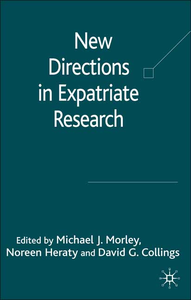Moving the research agenda forward on expatriate return on investment
McNulty, Yvonne M., and Tharenou, Phyllis (2006) Moving the research agenda forward on expatriate return on investment. In: Morley, Michael J., Heraty, Noreen, and Collings, David G., (eds.) New Directions in Expatriate Research. Palgrave Macmillan, UK, pp. 18-38.
![[img]](https://researchonline.jcu.edu.au/14947/2.hassmallThumbnailVersion/14947_McNulty_%26_Tharenou_2006_front_cover.jpg)
|
Image (JPEG) (Book Cover)
- Cover Image
Download (19kB) |
|
|
PDF (Published Version)
- Published Version
Restricted to Repository staff only |
Abstract
The costs associated with a long-term international assignment, defined as the relocation of an employee abroad by a firm for a year or more (Cendant, 2002, 2004; Boyacigiller, 2000; Kobrin, 1988; KPMG International, 2003; Mercer Human Resource Consulting, 2003), are high. Some evidence suggests that the costs exceed $1 million per assignee and per assignment, and that the total cost to US multinational corporations (MNCs) is about $75 billion a year (Copeland and Griggs, 1985; Sheridan, 1998). In spite of the costs, a recent industry survey indicated that it is possible that long-term international assignments provide little return on investment (ROI) (GMAC/NFTC/SHRM 2002 survey). As Black, Gregersen, Mendenhall and Stroh (1999: 2) said:
An international assignment is the single most powerful experience shaping the perspective and capabilities of effective global leaders. It also happens to be the single most expensive per-person investment that a company makes in globalizing their people. It is unfortunate that most firms are getting anemic returns on this substantial investment.
Understanding how to obtain a return on investment from long-term assignments is important. The reporting of expatriate assignment failures, with 44 per cent of MNCs reporting failures in the Asia Pacific region and 63 per cent in Europe (Cendant, 2001), seems to indicate that the direct and non-direct costs associated with expatriation are substantial. Yet industry surveys show that expatriate ROI is not only poorly calculated amongst MNCs but is also not widely used as a tool to reduce expatriate costs (GMAC/NFTC/SHRM 2002 survey). For example, only 30 per cent of respondents in the GMAC/NFTC/SHRM 2002 survey rated their expatriate ROI as 'good' or 'excellent', with only 9 per cent indicating they had specific programmes in place to improve it. In fact, 70 per cent of the respondents rated their ROI as average, fair, or poor. Other industry surveys show that, to avoid the costs of long-term assignments, MNCs use a range of alternatives including virtual assignments and teleworking, short-term assignments, business trips, cross-border commuting, frequent flying, and host country nationals (HCNs) (Cendant, 2002; GMAC/NFTC/SHRM 2002 survey; KPMG International, 2003; PricewaterhouseCoopers, 2001, 2002). Yet, despite the costs, many MNCs continue to use long-term assignments (Cendant, 2004; Mercer Human Resource Consulting, 2003; PricewaterhouseCoopers, 2002) even when cost-effective alternatives are available. This is because the costs associated with expatriation are only one of several factors that are considered when approving international assignments (KPMG, 2004). Determining a return on investment is therefore necessary to justify the continued use of these assignments.
| Item ID: | 14947 |
|---|---|
| Item Type: | Book Chapter (Research - B1) |
| ISBN: | 978-1-4039-4297-5 |
| Date Deposited: | 23 Dec 2010 01:04 |
| FoR Codes: | 15 COMMERCE, MANAGEMENT, TOURISM AND SERVICES > 1503 Business and Management > 150308 International Business @ 100% |
| SEO Codes: | 97 EXPANDING KNOWLEDGE > 970115 Expanding Knowledge in Commerce, Management, Tourism and Services @ 100% |
| Downloads: |
Total: 130 Last 12 Months: 5 |
| More Statistics |



